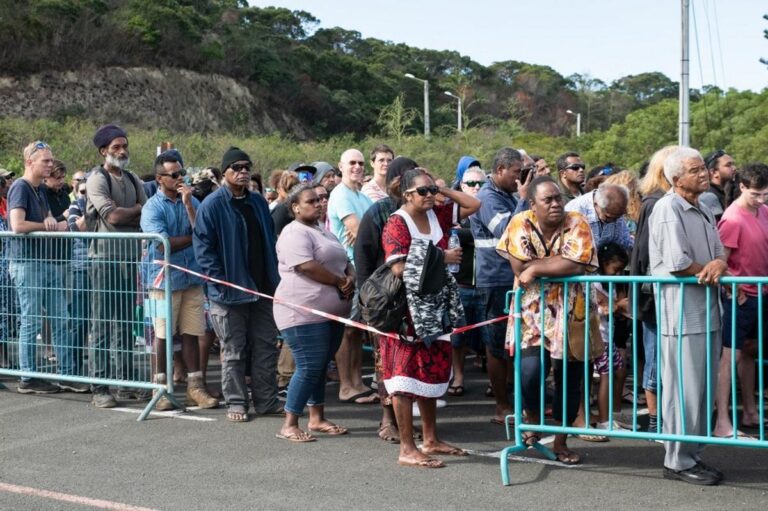France began voting on July 7 in crucial runoff elections that could deliver a historic victory for Marine Le Pen’s far-right Rally National party and its inward-looking, anti-immigration vision, or lead to a hanging parliament and years of political deadlock.
French President Emmanuel Macron has taken a big gamble by dissolving Parliament and calling general elections after his centrist party suffered a crushing defeat in the June 9 European Parliament elections.
The elections in the nuclear-armed country are almost certain to have implications for the war in Ukraine, international diplomacy and Europe’s economic stability, dealing a blow to President Emmanuel Macron’s remaining three years in office.
In the first round of voting on June 30, the anti-immigration, nationalist Rally National party led by Marine Le Pen won the largest number of votes in history.
Sunday’s vote will determine which party controls the National Assembly and who the prime minister will be, and if Mr Macron’s weak centrist majority weakens further, he could be forced to share power with parties that oppose many of his pro-business, pro-European Union policies.
Racism, anti-Semitism and Russian cyber attacks have marred the campaign, with more than 50 candidates reporting physical attacks – highly unusual in France – and the government plans to deploy 30,000 police on election day.
The tensions come as France is celebrating a very special summer: Paris is about to host a hugely ambitious Olympics, the national football team is reaching the semi-finals of Euro 2024 and the Tour de France is running with the Olympic torch across the country.
Meanwhile, 49 million voters are in the midst of the country’s most important election in decades.
If the Rally National wins an absolute majority and its 28-year-old leader, Jordan Bardella, becomes prime minister, France would have its first far-right government since the Nazi occupation during World War II. The party came first in the first round of voting last week, followed by a coalition of center-left parties, far-left parties and the Greens, as well as Macron’s centrist bloc.
The outcome remains highly uncertain. Opinion polls taken between the two rounds of voting suggest the Rally National may win the most seats in the 577-seat National Assembly but fall short of the 289 seats needed for a majority. It would make history if a party long considered a pariah with historical ties to xenophobia and Holocaust downplaying becomes France’s largest political force.
If he wins a majority, Macron would be forced to share power under an unwieldy arrangement known in France as “coexistence.”
Another possibility is that no party will win a majority, leaving parliament in limbo, which could lead Macron to negotiate a coalition with a center-left coalition or to form a non-party technocratic government.
Both developments are unprecedented for modern France and will make it harder for the European Union’s second-largest economy to make bold decisions on arms sales to Ukraine, reforming labor laws or reducing a huge budget deficit.Financial markets have been reeling since Macron surprised even his closest allies in June by announcing early elections after his National Rally party won the most seats in the European Parliament elections.
Many French voters, especially in smaller towns and rural areas, are frustrated with low incomes and a political leadership in Paris that they see as elitist and out of touch with the daily struggles of working people. The Rally National has built up broad and deep support over the past decade by connecting with these voters, in part by blaming immigration for France’s problems.
Le Pen has softened many of the party’s positions and no longer calls for withdrawal from NATO and the EU in order to make the party more likely to win elections, but the party’s core far-right values remain intact: it wants a referendum on citizenship by mere birth in France, limits on the rights of dual nationals and greater freedom for police to use weapons.
The second round of voting began Saturday in France’s overseas territories, stretching from the South Pacific to the Caribbean, the Indian Ocean and the North Atlantic. Elections will close at 8 p.m. (1800 GMT) on Sunday in mainland France. First voting projections are due to be published Sunday evening, with official early results due late Sunday or early Monday.
Macron said he would not step down, whatever happened, and would stay on as president until the end of his term in 2027.
This is a premium article available only to our subscribers. To read over 250 premium articles every month,
You’ve reached your limit for free articles. Support quality journalism.
You’ve reached your limit for free articles. Support quality journalism.
You have read {{data.cm.views}} from {{data.cm.maxViews}} Free articles.
This is the last free article.

